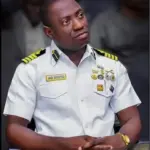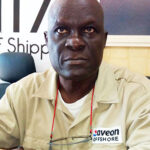Engineer Bob Yousuo (National President, Nigerian Merchant Navy)
 NIMASA as the regulatory agency should as a matter of urgency issue a Marine Notice to all seafarers’ employers engaged in this slavery attitude to take caution about the non-payment of wages and under payment to Nigerian seafarers; this is the current trend in our maritime sector. A sanction should be placed on any company with such an act. The Nigeria maritime institution should be upgraded both in facilities and personnel to meet international standards for the issuance of Class II & I, that will enable Nigerian seafarers to work onboard foreign and bigger vessels. We urge NIMASA to open up relationships with other maritime nations for COC’s recognition and employment of Nigerian seafarers.
NIMASA as the regulatory agency should as a matter of urgency issue a Marine Notice to all seafarers’ employers engaged in this slavery attitude to take caution about the non-payment of wages and under payment to Nigerian seafarers; this is the current trend in our maritime sector. A sanction should be placed on any company with such an act. The Nigeria maritime institution should be upgraded both in facilities and personnel to meet international standards for the issuance of Class II & I, that will enable Nigerian seafarers to work onboard foreign and bigger vessels. We urge NIMASA to open up relationships with other maritime nations for COC’s recognition and employment of Nigerian seafarers.
In view of the above I want to conclude by saying that the Director General of NIMASA is on the right track. I urge him to strengthen the Task Force on Cabotage implementation, Ship Registry department and ensure scarcity of Discharge booklets are things of the past. Marine notice should be issued to all shipping companies to have CBA in their individual companies with the respective unions.
Captain Alfred Oniye (Secretary General, MESAN)
 The government should prioritize timely crew changes, reduce extended onboard stays, enforce fair wages and adhere to the Maritime Labour Convention guidelines. They should ensure wages reflect seafarers’ contributions, address stagnant wages and provide opportunities for career growth. They should provide adequate water, nutritious meals, proper gym facilities, and combat food shortages onboard, strengthen enforcement of labour laws to prevent exploitative practices. Additionally, they should invest in training and certifying qualified seafarers to meet industry standards. If the government can implement these measures, it will enhance seafarers’ lives
The government should prioritize timely crew changes, reduce extended onboard stays, enforce fair wages and adhere to the Maritime Labour Convention guidelines. They should ensure wages reflect seafarers’ contributions, address stagnant wages and provide opportunities for career growth. They should provide adequate water, nutritious meals, proper gym facilities, and combat food shortages onboard, strengthen enforcement of labour laws to prevent exploitative practices. Additionally, they should invest in training and certifying qualified seafarers to meet industry standards. If the government can implement these measures, it will enhance seafarers’ lives
Captain Tajudeen Alao (National
 The Ministry of Labour, NSITF, the Safety Administration, ship owners, and ship operators on one side, the Maritime Workers Union and Manning Agents on another side, need to sit down together twice a year to discuss the contents of Collective Bargaining Agreement for seafarers and how well it is being run. The Maritime Labour Convention that has been domesticated in Nigeria has a mandatory declaration part 11 to be complied with by employers of seafarers, in line with the signed treaty. This compliance aspect is to be enforced before issuance of MLC Certificate. Seafarers must be educated and encouraged on employment insurance and health schemes and the need to key into that scheme. Finally, job guarantee for Nigerian seafarers to be taken as an enforceable task as enshrined in Nigerian Constitution, Cabotage Act and Local Contents Act.
The Ministry of Labour, NSITF, the Safety Administration, ship owners, and ship operators on one side, the Maritime Workers Union and Manning Agents on another side, need to sit down together twice a year to discuss the contents of Collective Bargaining Agreement for seafarers and how well it is being run. The Maritime Labour Convention that has been domesticated in Nigeria has a mandatory declaration part 11 to be complied with by employers of seafarers, in line with the signed treaty. This compliance aspect is to be enforced before issuance of MLC Certificate. Seafarers must be educated and encouraged on employment insurance and health schemes and the need to key into that scheme. Finally, job guarantee for Nigerian seafarers to be taken as an enforceable task as enshrined in Nigerian Constitution, Cabotage Act and Local Contents Act.
Comrade Ben Aikhomu (Seaman, MWUN)
 The government has to put in place instruments and tools of enforcement of various seafaring laws, policies and international conventions as domesticated. Professional laws should be enforced. The government has put in place a lot of wonderful enactments that have not been honestly enforced. More so, encouragement should be given to indigenous ship owners narrowing down on taxes, levies and duties for ship acquisition in addition to enhanced professional training for seafarers and up-grading of our maritime instructions.
The government has to put in place instruments and tools of enforcement of various seafaring laws, policies and international conventions as domesticated. Professional laws should be enforced. The government has put in place a lot of wonderful enactments that have not been honestly enforced. More so, encouragement should be given to indigenous ship owners narrowing down on taxes, levies and duties for ship acquisition in addition to enhanced professional training for seafarers and up-grading of our maritime instructions.
Officer Utibe-Abasi Isaac (Maritime Graduate)
 The principal way these problems can be addressed is by enforcing international maritime laws and implementation of the Cabotage Act, because these challenges are identified in the International Labour Laws, Merchant Shipping Act and the Cabotage Act respectively, but lack of enforcement makes it dormant. In addressing this problems, the Presidency, the National Assembly, agencies of government, institutions and maritime stakeholders must put their heads together and come to a drawing board to agree to ensure that more local laws are enacted where necessary, total compliance and enforcement of already existing international and local law. I also want to urge the Director General of NIMASA to create a Coast Guard as it’s task force for Cabotage implementation and enforcement as well as ensure the availability of Discharge Booklets for seafarers.
The principal way these problems can be addressed is by enforcing international maritime laws and implementation of the Cabotage Act, because these challenges are identified in the International Labour Laws, Merchant Shipping Act and the Cabotage Act respectively, but lack of enforcement makes it dormant. In addressing this problems, the Presidency, the National Assembly, agencies of government, institutions and maritime stakeholders must put their heads together and come to a drawing board to agree to ensure that more local laws are enacted where necessary, total compliance and enforcement of already existing international and local law. I also want to urge the Director General of NIMASA to create a Coast Guard as it’s task force for Cabotage implementation and enforcement as well as ensure the availability of Discharge Booklets for seafarers.
Captain Akinpelumi Taiwo (Master Mariner)
 As we look to the future, the maritime industry faces both challenges and opportunities. Climate change, technological advancements, and evolving regulations present new frontiers for us to navigate. However, with challenges come opportunities for innovation and growth. We must be proactive in adopting sustainable practices, integrating cutting edge technology, and investing in the continuous development of our seafarers.
As we look to the future, the maritime industry faces both challenges and opportunities. Climate change, technological advancements, and evolving regulations present new frontiers for us to navigate. However, with challenges come opportunities for innovation and growth. We must be proactive in adopting sustainable practices, integrating cutting edge technology, and investing in the continuous development of our seafarers.
To navigate the future effectively, we must empower our seafarers with the skills, knowledge, and support needed to excel. This includes ongoing training, mental health support, and ensuring fair and equitable working conditions. NIMASA should be dedicated to fostering an environment where seafarers can thrive, where their voices are heard, and where their contributions are valued.
Engr. Matthew Alalade (Former President, Merchant Navy)
 NIMASA should be involved squarely in the welfare of seafarers. The government should enhance the certificates of seafarers for global acceptability. The curriculum and certification should be upgraded like the ones in other countries in West Africa, so that we can compete with other countries. There should be MoUs with countries trading with neighboring countries.
NIMASA should be involved squarely in the welfare of seafarers. The government should enhance the certificates of seafarers for global acceptability. The curriculum and certification should be upgraded like the ones in other countries in West Africa, so that we can compete with other countries. There should be MoUs with countries trading with neighboring countries.
Chris Sadoh (Stars Maritime)
 Government must ensure Nigeria has a national flagged ship. Government approved academies should be encouraged to operate in all ramifications and whittle down the degree of corruption in maritime domain. Lastly, intensive marketing of maritime professions for Nigerians to take advantage of.
Government must ensure Nigeria has a national flagged ship. Government approved academies should be encouraged to operate in all ramifications and whittle down the degree of corruption in maritime domain. Lastly, intensive marketing of maritime professions for Nigerians to take advantage of.















